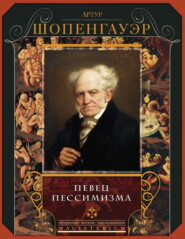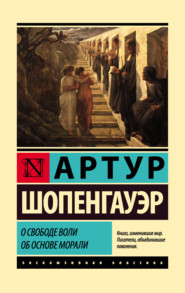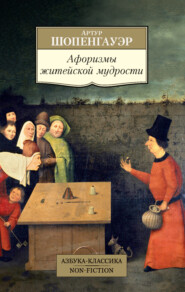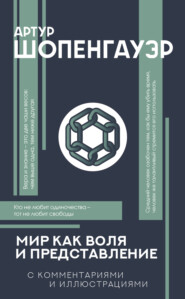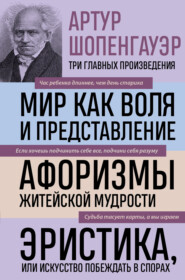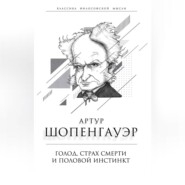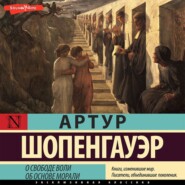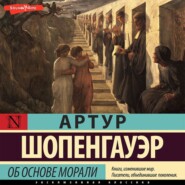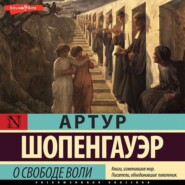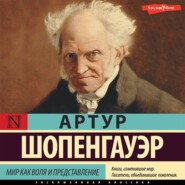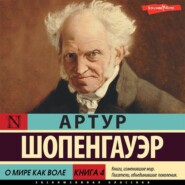По всем вопросам обращайтесь на: info@litportal.ru
(©) 2003-2024.
✖
The Essays of Arthur Schopenhauer; Counsels and Maxims
Настройки чтения
Размер шрифта
Высота строк
Поля
27
Menander. Monost: 422.
28
Goethe.
29
Epist. I. xviii. 97.
30
Nouveaux Essais. Liv. I. ch. 2. Sec. 11.
31
Of. Welt als Wille und Vorstellung, 4th Edition. Bk. II. pp. 236-40.
32
Cf. loc: cit: p. 275. Sleep is a morsel of death borrowed to keep up and renew the part of life which is exhausted by the day —le sommeil est un emprunt fait à la mort. Or it might be said that sleep is the interest we have to pay on the capital which is called in at death; and the higher the rate of interest and the more regularly it is paid, the further the date of redemption is postponed.
33
Translator's Note. The work to which Schopenhauer here refers is a series of essays by Cabanis, a French philosopher (1757-1808), treating of mental and moral phenomena on a physiological basis. In his later days, Cabanis completely abandoned his materialistic standpoint.
34
Goethe's Faust, Part I.
35
Translator's Note. Helvetius, Claude-Adrien (1715-71), a French philosophical writer much esteemed by Schopenhauer. His chief work, De l'Esprit, excited great interest and opposition at the time of its publication, on account of the author's pronounced materialism.
36
See, for instance, Stobasus, Eclog. I. xxii. 9.
37
To forgive and forget means to throw away dearly bought experience.
38
Translator's Note. Aventurine is a rare kind of quartz; and the same name is given to a brownish-colored glass much resembling it, which is manufactured at Murano. It is so called from the fact that the glass was discovered by chance (arventura).
39
De Clementia, I. 1.
40
Act iv., se. 4.
41
Cf. Welt als Wills und Vorstellung, Bk. II. p. 256 (4th Edit.), where I quote from Dr. Johnson, and from Merck, the friend of Goethe's youth. The former says: There is nothing by which a man exasperates most people more, than by displaying a superior ability of brilliancy in conversation. They seem pleased at the time, but their envy makes them curse him at their hearts. (Boswells Life of Johnson aetat: 74).
42
Translator's Note. – Balthazar Graeian, Oraculo manual, y arte de prudencia, 240. Gracian (1584-1658) was a Spanish prose writer and Jesuit, whose works deal chiefly with the observation of character in the various phenomena of life. Schopenhauer, among others, had a great admiration for his worldly philosophy, and translated his Oraculo manual– a system of rules for the conduct of life – into German. The same book was translated into English towards the close of the seventeenth century.
43
If you desire to get on in the world, friends and acquaintances are by far the best passport to fortune. The possession of a great deal of ability makes a man proud, and therefore not apt to flatter those who have very little, and from whom, on that account, the possession of great ability should be carefully concealed. The consciousness of small intellectual power has just the opposite effect, and is very compatible with a humble, affable and companionable nature, and with respect for what is mean and wretched. This is why an inferior sort of man has so many friends to befriend and encourage him.
These remarks are applicable not only to advancement in political life, but to all competition for places of honor and dignity, nay, even for reputation in the world of science, literature and art. In learned societies, for example, mediocrity – that very acceptable quality – is always to the fore, whilst merit meets with tardy recognition, or with none at all. So it is in everything.
44
Translator's Note. – In the passage referred to (Grundlage der Moral, collected works, Vol. IV., pp. 187 and 198), Schopenhauer explains politeness as a conventional and systematic attempt to mask the egoism of human nature in the small affairs of life, – an egoism so repulsive that some such device is necessary for the purpose of concealing its ugliness. The relation which politeness bears to the true love of one's neighbor is analogous to that existing between justice as an affair of legality, and justice as the real integrity of the heart.
45
Translator's Note. – Schopenhauer alludes to the following passage in Bacon's De Augmentis Scientiarum, Bk. viii., ch. 2: Sicut enim dici solet de calumnia, audacter calumniare, semper aliquid haeret; sic dici potest de jactantia, (nisi plane deformis fuerit et ridicula), audacter te vendita, semper aliquid haeret. Haerebit certe apud populum, licet prudentiores subrideant. Itaque existimatio parta apud plurimos paucorum fastidium abunde compensabit.
46
He seems to have been referring to a game something like backgammon.
47
Translator's Note. – This obscure word appears to be derived from the Greek sugtaereo (N.T. and Polyb.) meaning "to observe strictly." It occurs in The Doctor and Student, a series of dialogues between a doctor of divinity and a student on the laws of England, first published in 1518; and is there (Dialog. I. ch. 13) explained as "a natural power of the soule, set in the highest part thereof, moving and stirring it to good, and abhoring evil." This passage is copied into Milton's Commonplace Book, edit. Horwood, § 79. The word is also found in the Dictionary of the Spanish Academy (vol. vi. of the year 1739) in the sense of an innate discernment of moral principles, where a quotation is given from Madre Maria de Jesus, abbess of the convent of the Conception at Agreda, a mystical writer of the seventeenth century, frequently consulted by Philip IV., – and again in the Bolognese Dictionary of 1824, with a similar meaning, illustrated from the writings of Salvini (1653-1729). For these references I am indebted to the kindness of Mr. Norman Maccoll.
48
Chance plays so great a part in all human affairs that when a man tries to ward off a remote danger by present sacrifice, the danger often vanishes under some new and unforeseen development of events; and then the sacrifice, in addition to being a complete loss, brings about such an altered state of things as to be in itself a source of positive danger in the face of this new development. In taking measures of precaution, then, it is well not to look too far ahead, but to reckon with chance; and often to oppose a courageous front to a danger, in the hope that, like many a dark thunder-cloud, it may pass away without breaking.
49
I may remark, parenthetically, that all this is a confirmation of the principle laid down in Die Welt als Wille und Vorstellung (Bk. I. p. 94: 4th edit.), that error always consists in making a wrong inference, that is, in ascribing a given effect to something that did not cause it.
50
All's Well that Ends Well, Act. ii. Sc. 2.
51
Menander. Monost: 422.
28
Goethe.
29
Epist. I. xviii. 97.
30
Nouveaux Essais. Liv. I. ch. 2. Sec. 11.
31
Of. Welt als Wille und Vorstellung, 4th Edition. Bk. II. pp. 236-40.
32
Cf. loc: cit: p. 275. Sleep is a morsel of death borrowed to keep up and renew the part of life which is exhausted by the day —le sommeil est un emprunt fait à la mort. Or it might be said that sleep is the interest we have to pay on the capital which is called in at death; and the higher the rate of interest and the more regularly it is paid, the further the date of redemption is postponed.
33
Translator's Note. The work to which Schopenhauer here refers is a series of essays by Cabanis, a French philosopher (1757-1808), treating of mental and moral phenomena on a physiological basis. In his later days, Cabanis completely abandoned his materialistic standpoint.
34
Goethe's Faust, Part I.
35
Translator's Note. Helvetius, Claude-Adrien (1715-71), a French philosophical writer much esteemed by Schopenhauer. His chief work, De l'Esprit, excited great interest and opposition at the time of its publication, on account of the author's pronounced materialism.
36
See, for instance, Stobasus, Eclog. I. xxii. 9.
37
To forgive and forget means to throw away dearly bought experience.
38
Translator's Note. Aventurine is a rare kind of quartz; and the same name is given to a brownish-colored glass much resembling it, which is manufactured at Murano. It is so called from the fact that the glass was discovered by chance (arventura).
39
De Clementia, I. 1.
40
Act iv., se. 4.
41
Cf. Welt als Wills und Vorstellung, Bk. II. p. 256 (4th Edit.), where I quote from Dr. Johnson, and from Merck, the friend of Goethe's youth. The former says: There is nothing by which a man exasperates most people more, than by displaying a superior ability of brilliancy in conversation. They seem pleased at the time, but their envy makes them curse him at their hearts. (Boswells Life of Johnson aetat: 74).
42
Translator's Note. – Balthazar Graeian, Oraculo manual, y arte de prudencia, 240. Gracian (1584-1658) was a Spanish prose writer and Jesuit, whose works deal chiefly with the observation of character in the various phenomena of life. Schopenhauer, among others, had a great admiration for his worldly philosophy, and translated his Oraculo manual– a system of rules for the conduct of life – into German. The same book was translated into English towards the close of the seventeenth century.
43
If you desire to get on in the world, friends and acquaintances are by far the best passport to fortune. The possession of a great deal of ability makes a man proud, and therefore not apt to flatter those who have very little, and from whom, on that account, the possession of great ability should be carefully concealed. The consciousness of small intellectual power has just the opposite effect, and is very compatible with a humble, affable and companionable nature, and with respect for what is mean and wretched. This is why an inferior sort of man has so many friends to befriend and encourage him.
These remarks are applicable not only to advancement in political life, but to all competition for places of honor and dignity, nay, even for reputation in the world of science, literature and art. In learned societies, for example, mediocrity – that very acceptable quality – is always to the fore, whilst merit meets with tardy recognition, or with none at all. So it is in everything.
44
Translator's Note. – In the passage referred to (Grundlage der Moral, collected works, Vol. IV., pp. 187 and 198), Schopenhauer explains politeness as a conventional and systematic attempt to mask the egoism of human nature in the small affairs of life, – an egoism so repulsive that some such device is necessary for the purpose of concealing its ugliness. The relation which politeness bears to the true love of one's neighbor is analogous to that existing between justice as an affair of legality, and justice as the real integrity of the heart.
45
Translator's Note. – Schopenhauer alludes to the following passage in Bacon's De Augmentis Scientiarum, Bk. viii., ch. 2: Sicut enim dici solet de calumnia, audacter calumniare, semper aliquid haeret; sic dici potest de jactantia, (nisi plane deformis fuerit et ridicula), audacter te vendita, semper aliquid haeret. Haerebit certe apud populum, licet prudentiores subrideant. Itaque existimatio parta apud plurimos paucorum fastidium abunde compensabit.
46
He seems to have been referring to a game something like backgammon.
47
Translator's Note. – This obscure word appears to be derived from the Greek sugtaereo (N.T. and Polyb.) meaning "to observe strictly." It occurs in The Doctor and Student, a series of dialogues between a doctor of divinity and a student on the laws of England, first published in 1518; and is there (Dialog. I. ch. 13) explained as "a natural power of the soule, set in the highest part thereof, moving and stirring it to good, and abhoring evil." This passage is copied into Milton's Commonplace Book, edit. Horwood, § 79. The word is also found in the Dictionary of the Spanish Academy (vol. vi. of the year 1739) in the sense of an innate discernment of moral principles, where a quotation is given from Madre Maria de Jesus, abbess of the convent of the Conception at Agreda, a mystical writer of the seventeenth century, frequently consulted by Philip IV., – and again in the Bolognese Dictionary of 1824, with a similar meaning, illustrated from the writings of Salvini (1653-1729). For these references I am indebted to the kindness of Mr. Norman Maccoll.
48
Chance plays so great a part in all human affairs that when a man tries to ward off a remote danger by present sacrifice, the danger often vanishes under some new and unforeseen development of events; and then the sacrifice, in addition to being a complete loss, brings about such an altered state of things as to be in itself a source of positive danger in the face of this new development. In taking measures of precaution, then, it is well not to look too far ahead, but to reckon with chance; and often to oppose a courageous front to a danger, in the hope that, like many a dark thunder-cloud, it may pass away without breaking.
49
I may remark, parenthetically, that all this is a confirmation of the principle laid down in Die Welt als Wille und Vorstellung (Bk. I. p. 94: 4th edit.), that error always consists in making a wrong inference, that is, in ascribing a given effect to something that did not cause it.
50
All's Well that Ends Well, Act. ii. Sc. 2.
51






